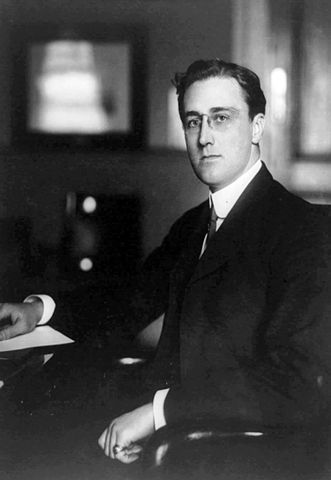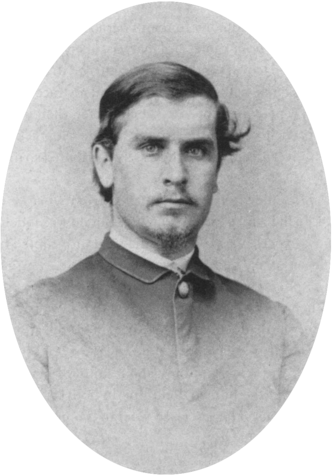Franklin Delano Roosevelt knew bureaucracy: “You know, I’m a juggler, and I never let my right hand know what my left hand does.”

As in many aspects of FDR’s life, his wife’s uncle was a model. As Assistant Secretary of the Navy, young hotshot Uncle Theodore proved chronically wearisome to his boss, veteran Massachusetts state Republican machine cog John Davis Long. When Long took a day off once, Uncle Theodore, liberated by a sudden vacuum of adult supervision, tried to start a war. Long countermanded Uncle Theodore’s orders but it was too late: Uncle Theodore had his war and it was splendid.

In 1913, to prevent regime uncertainty, newly elected Thomas Woodrow Wilson (may his bones be crushed) said, “Fine, you want a Roosevelt as Assistant Secretary of the Navy, I got your Roosevelt as Assistant Secretary of the Navy right here.” So into the family sinecure went spunky 31 year old New York State Democratic Senator Franklin Delano Roosevelt. He immediately commenced his own Long struggle against his boss, Raleigh, North Carolina News & Observer publisher and race baiter Josephus Daniels. While Daniels focused on high-level issues like controlling every radio in America, FDR Uncle Theodored him by secretly lobbying Congress to build up U.S. naval strength to levels Daniels opposed. FDR even attempted to start his own splendid little war by mobilizing the U.S. Navy against unrestricted Hun submarine attacks in 1917.
Direct adult supervision in the schoolmarmish form of Thomas Woodrow Wilson (may his bones be crushed) intervened. There would be no Roosevelt family shenanigans on his watch: Thomas Woodrow Wilson (may his bones be crushed) sided with the Army and reintroduced conscription rather than let Uncle Theodore ride Rough Riders II to a second bid for a third term. He kept FDR in the Navy Department and out of uniform to prevent his kept Roosevelt from showboating. Even then he couldn’t stop every FDR attempt to emulate Uncle Theodore: as Uncle Theodore was able to turn Rough Riders I into the (winning) Republican vice presidential nomination in 1900, twenty years later FDR turned his Assistant Secretary exploits into the (losing) Democratic vice presidential nomination.
That attempt failed due to public weariness with Thomas Woodrow Wilson (may his bones be crushed). In Wilson (mhbbc), FDR had one extreme example of presidential management: Wilson (mhbbc) was a dictatorial micro-manager who rarely delegate, micromanaged details, and even typed his own speeches. His madness for control killed his precious precious Versailles treaty in the U.S. Senate and nearly killed him with such a serious stroke that Mrs. Wilson became our first woman president.

FDR’s other example, the anti-Wilson (mhbbc), was Silent Hand Will. While the Uncle Theodores of the world sought to move events by moving the world, William McKinley, Jr. let the world rotate to him. Like Tolstoy’s Marshal Kutuzov in War and Peace, he was a Taoist sage king: he did everything by doing nothing:
So a wise leader may say:
“I practice inaction, and the people look after themselves.”
But from the Sage it is so hard at any price to get a single word
That when his task is accomplished, his work done,
Throughout the country every one says: “It happened of its own accord”. (chap. 17, tr. Waley)

Brownian motion generated by Uncle Theodorish tumults brought opportunity to Silent Hand Will’s front porch without Silent Hand Will having to leave it. He moved events by not moving: McKinley did not go to the mountain. The mountain came to McKinley.
International Anarchy assassinated McKinley out of fear: as a ruler who ruled without ruling, he was a living rebuke to their fantasy of governing without government. Their efforts were more than rewarded by Uncle Theodore’s bumper crop of frenetic governance in the years after he succeeded the dead McKinley.
FDR blended Thomas Woodrow Wilson (may his bones be crushed) and Silent Hand Will: he micromanaged by doing nothing. FDR would appoint two competent yet ambitious men, a Harry Hines Woodring as a boss and a Louis A. Johnson as his Assistant. The Woodring and the Johnson would have beliefs that both fell within the range allowed by FDR’s coalition but differed enough that the two men came from opposite camps within FDR’s coalition. The Woodring and the Johnson would also be alpha males with rival ambitions. They would energetically pursue their agendas but couldn’t coordinate with each other out of mutual loathing. They would need an arbiter. And who would this disinterested arbiter be? Franklin Delano Roosevelt.
Both the Woodring and the Johnson would seek Roosevelt’s support in their turf battle. They would both find a sympathetic listener who whispered pleasant but vague sweet nothings in their ears. Roosevelt would triangulate between them, bending this way and bending that way as the men and their respective political support networks waxed and waned. They would compete for his support by trying to out effective the other. While they were useful, they were kept. When they were done, they were tossed overboard with smiling yet ruthless efficiency. His right Woodring never knew what his left Johnson was doing.
The men who followed FDR were less effective. As initiates into the cult of Frederick Winslow Taylor, they drew a map and saw territory where FDR saw territory and drew a map. Where FDR understood that politics is the division of power and ruled in ways that kept the inevitable internecine feuding of private fiefdoms and tribes that arise in any human institution from being crippling, his successors committed four major fallacies of politics:
- the appeal to virtue: if we only get the right people people in there, politics will be banished through virtue
- the appeal to Führerprinzip: if we only get the right leader in there, politics will be banished through leadership
- the appeal to de-duplication: if we only eliminate duplicate efforts, politics will be banished by reducing multiple competing centers to one harmonious center
- the appeal to boxes and straight lines: if we only have the right boxes connected by the right lines, politics will be banished by rational compartmentalization and proper channels
So they folded the old Navy and War Departments and a newly independent Air Force into one huge lump with clean lines of authority on paper led by one Secretary of defense. This allowed the services to continue their age old war of land vs. sea vs. air as before but now they had enough consolidated interest to band together as needed to shield their parochial turf battles from from outside meddlers.
It also created a single bottleneck so fragile that William Perry, acting under the broader Clinton-era policy of expanding the funding base of the Democratic Party by recartelizing American business under the guise of naive free market ideology, could force consolidation on the military industrial complex. The result, as with Clinton-era cartelization in other sectors of the economy, was the rise of too-big-to-fail defense contractors who needed constant assured bailouts in the form of too-big-to-fail procurement programs to stay afloat. It also distorted America’s strategic posture since the political need to keep a united front against outside intervention meant that organic capabilities like close air support were moved to alien hosts.
The Department of Defense should be abolished. Moldy Progressive Era naive reductionism took what were discernibly visible separate political interests before 1947 and consolidated them into one indiscernibly invisible political interest. What were once clearly defined fiefdoms are now one amorphous Leviathan rent by the same internal squables. What was once a diversified privately-owned procurement base is now a narrow necrotic oligopoly of de facto state-owned companies.
It is more fitting with the spirit of republican institutions to return to pre-1947 practice. A more politically rational national defense structure, one that clearly labels inter-service squabbles with a clarity rarely since before 1947, could resemble the following:
- War Department – led by a cabinet level civilian Secretary of War who commands all military forces in the event of military operations.
- Department of the Army – led by cabinet level civilian Secretary of the Army, fights for dollars for the U.S. Army.
- Department of the Navy – led by a cabinet level civilian Secretary of the Navy, fights for dollars for the U.S. Navy and commands its continuous efforts to deny the seas to foreign commerce. They have some nukes.
- Department of the Marines – led by a cabinet level civilian Secretary of the Marines, fights for dollars for the U.S. Marine Corps. Also handles all land-based tactical air support following the Safranski Plan. Shields land-based tactical airpower from Fighter Mafia depredations with glamorous dress uniforms. They have some nukes.
- Starfleet Command – led by a cabinet level civilian Starfleet Command, seeks out new life and new strategic air power targets in Douhet’s name. They have some nukes.
- Treasury Department – they run the Coast Guard.
- Department of the Militia – led by a cabinet level civilian Secretary of the Militia, fights for dollars for state militias.
Only through transparent feuding between the armed services, without secret in house peace treaties, can a diversified private military-industrial base supported by independent patronage slush funds even be contemplated, let alone resurrected. As was said by FDR and as it was said of old in the greatest strategic library of all time:
But when thou doest alms, let not thy left hand know what thy right hand doeth:
— Matthew 6:3 , King James Version
“Drew a man and saw territory”…nicely put. The reification fallacy is a plague of our age.
C S Lewis, in That Hideous Strength, described his protagonist Mark, as sociologist, thusly:
“..his education had had the curious effect of making things that he read and wrote more real to him than the things he saw. Statistics about agricultural laboureres were the substance: any real ditcher, ploughman, or farmer’s boy, was the shadow…he had a great reluctance, in his work, to ever use such words as “man” or “woman.” He preferred to write about “vocational groups,” “elements,” “classes,” and “populations”: for, in his own way, he believed as firmly as any mystic in the superior reality of the things that are not seen.”
The syndrome is worst among academics, but by no means limited to them. I’ve know executives and consultants who say the position of a business on, say, the BCG 4-box diagram (cows, dogs, stars, question marks) as more “real” than the actual specifics of the business itself.
I appreciate the need to clarify the politics of our defense establishment. Elevating the decision making OUT of bureaucracy and into visible political action is a good plan.
But what modern president has had any use for his Cabinet? That institution no longer seems to serve any political need, at least for the president. Could Valerie Jarrett receive Senate confirmation, even with Reid in control?
Where would you put Cyber Commmand?